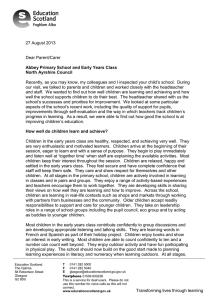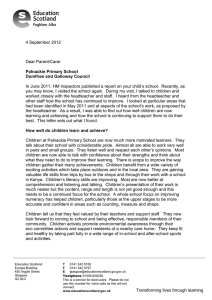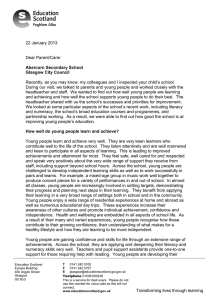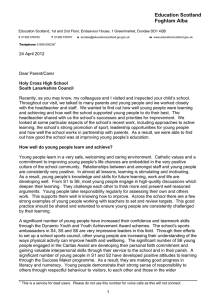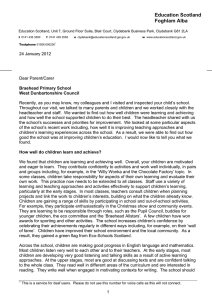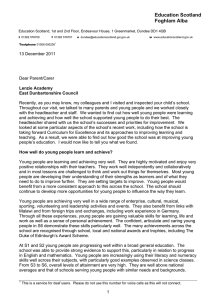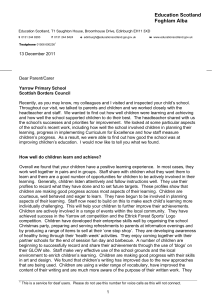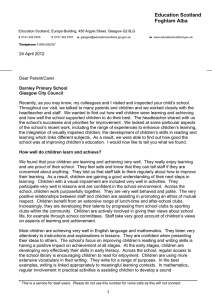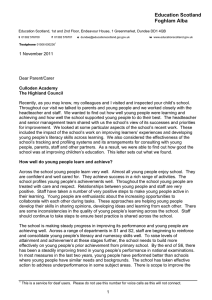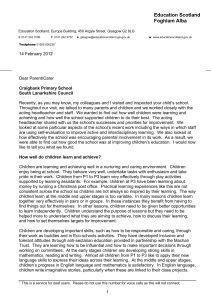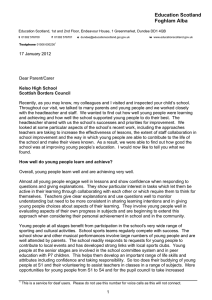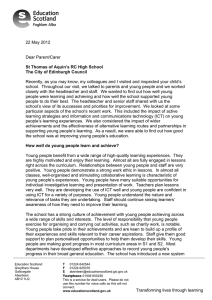Education Scotland Foghlam Alba
advertisement
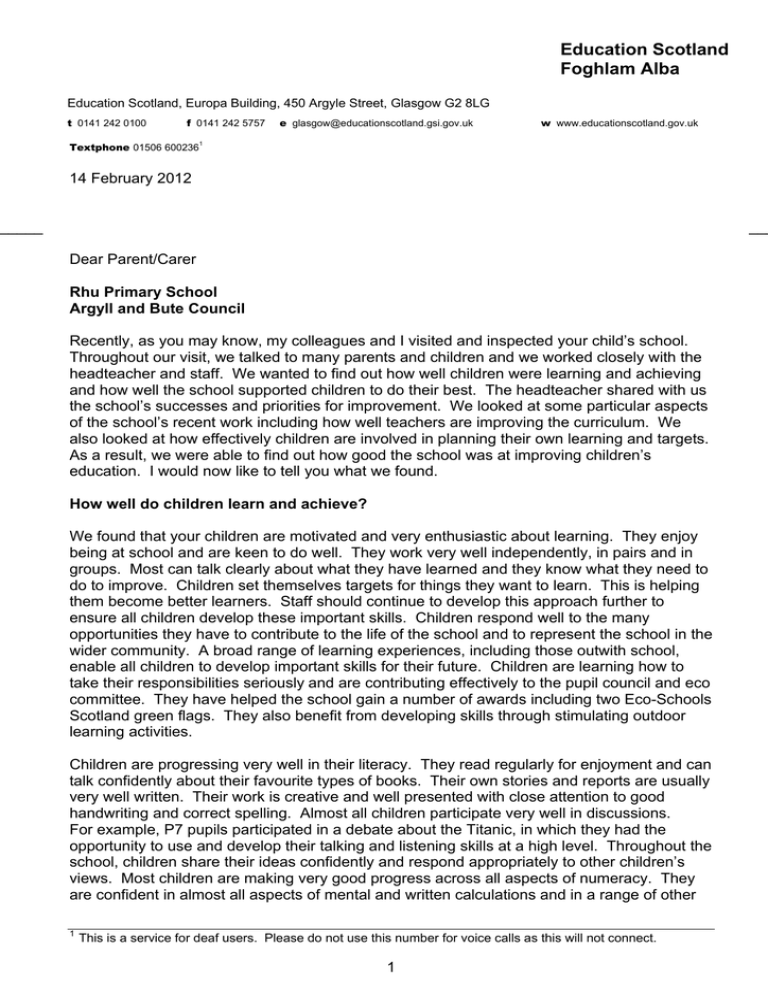
Education Scotland Foghlam Alba Education Scotland, Europa Building, 450 Argyle Street, Glasgow G2 8LG t 0141 242 0100 f 0141 242 5757 Textphone 01506 600236 e glasgow@educationscotland.gsi.gov.uk w www.educationscotland.gov.uk 1 14 February 2012 _____ ___ Dear Parent/Carer Rhu Primary School Argyll and Bute Council Recently, as you may know, my colleagues and I visited and inspected your child’s school. Throughout our visit, we talked to many parents and children and we worked closely with the headteacher and staff. We wanted to find out how well children were learning and achieving and how well the school supported children to do their best. The headteacher shared with us the school’s successes and priorities for improvement. We looked at some particular aspects of the school’s recent work including how well teachers are improving the curriculum. We also looked at how effectively children are involved in planning their own learning and targets. As a result, we were able to find out how good the school was at improving children’s education. I would now like to tell you what we found. How well do children learn and achieve? We found that your children are motivated and very enthusiastic about learning. They enjoy being at school and are keen to do well. They work very well independently, in pairs and in groups. Most can talk clearly about what they have learned and they know what they need to do to improve. Children set themselves targets for things they want to learn. This is helping them become better learners. Staff should continue to develop this approach further to ensure all children develop these important skills. Children respond well to the many opportunities they have to contribute to the life of the school and to represent the school in the wider community. A broad range of learning experiences, including those outwith school, enable all children to develop important skills for their future. Children are learning how to take their responsibilities seriously and are contributing effectively to the pupil council and eco committee. They have helped the school gain a number of awards including two Eco-Schools Scotland green flags. They also benefit from developing skills through stimulating outdoor learning activities. Children are progressing very well in their literacy. They read regularly for enjoyment and can talk confidently about their favourite types of books. Their own stories and reports are usually very well written. Their work is creative and well presented with close attention to good handwriting and correct spelling. Almost all children participate very well in discussions. For example, P7 pupils participated in a debate about the Titanic, in which they had the opportunity to use and develop their talking and listening skills at a high level. Throughout the school, children share their ideas confidently and respond appropriately to other children’s views. Most children are making very good progress across all aspects of numeracy. They are confident in almost all aspects of mental and written calculations and in a range of other 1 This is a service for deaf users. Please do not use this number for voice calls as this will not connect. 1 mathematical skills. Children’s understanding of health and wellbeing is very good indeed. They are very aware of the importance of making healthy choices, know about avoiding dangers and participate fully in activities which promote physical and emotional wellbeing. Children’s skills in art and design, and their knowledge about artists, are well developed. Across the school, children are developing effective skills in Information and Communications Technology (ICT) which they use to support their learning across a range of curriculum areas. For example, they use ICT presentations to share their work in an attractive way with their classes. How well does the school support children to develop and learn? The school is supporting your children very well to develop and learn. Staff know your children very well and set tasks and activities at the right level. Children are confident when working independently and seek help when they need it. Those who need help with their learning are given very good support. Individual support plans are in place and these contain relevant short- and long-term targets. Teachers and support staff work very well together to provide very effective and clearly targeted support to children. Class teachers and the support for learning teacher regularly discuss children’s learning together and with children themselves. Across the school, staff meet the care and welfare needs of children very well and, as a result, children feel happy and safe in the school. The school has very effective partnerships with parents and other professionals. They in turn give very good support to the school. Children are given a broad curriculum based on well-planned activities which are planned by using Curriculum for Excellence. For example, staff have made good progress in giving children a range of high-quality learning activities in literacy and numeracy, some of which are pitched well in real-life contexts. Other good examples include enterprise work, technology, and outdoor learning working with partners outwith school. Staff should continue this good practice by relating other areas of the curriculum to such relevant contexts. How well does the school improve the quality of its work? We are confident that the school is very well placed to maintain high standards in all areas, and to continue to improve the quality of its work. The headteacher has demonstrated high levels of care and commitment to the school over many years. She supports staff to make learning stimulating and relevant for all children. All staff are committed to improving the quality of children’s learning and achievement. They are confident in leading new and innovative approaches to help children achieve this. The two principal teachers are leading major improvements in the school. Staff work well in teams to reflect on what has worked well and to explore new ideas. The headteacher should continue to involve staff more in gathering evidence of progress and in measuring overall improvement. The school enjoys very positive partnerships with parents and the community. The headteacher should ensure that all staff, parents, children and partners contribute to, and are appropriately involved in agreeing a vision and evaluating the work of the school. This inspection of your school found the following key strengths. • • • • • Confident children who are articulate, well behaved and eager to learn. Support given by all staff to help children in their learning. Teamwork of staff in working together to improve children’s learning and achievement. Partnerships with parents and the wider community. Strong leadership given by the headteacher to school improvement and ethos. 2 We discussed with staff and the education authority how they might continue to improve the school. This is what we agreed with them. • • Continue to develop the curriculum using Curriculum for Excellence. Involve staff, parents, children and partners to greater effect in evaluating and improving the work of the school. What happens at the end of the inspection? We are satisfied with the overall quality of provision. We are confident that the school’s self-evaluation processes are leading to improvements. As a result, we will make no further visits in connection with this inspection. The local authority will inform parents about the school’s progress as part of the authority's arrangements for reporting to parents on the quality of its schools. Noreen Phillips HM Inspector Additional inspection evidence, such as details of the quality indicator evaluations, for your school can be found on the Education Scotland website at http://www.hmie.gov.uk/ViewEstablishment.aspx?id=7619&type=2 Please contact us if you want to know how to get the report in a different format, for example, in a translation. You can contact us at enquiries@educationscotland.gsi.gov.uk or write to us at BMCT, Education Scotland, Denholm House, Almondvale Business Park, Almondvale Way, Livingston EH54 6GA. If you want to give us feedback or make a complaint about our work, please contact 01506 600200, or write to us at the above address or e-mail: feedback@educationscotland.gsi.gov.uk. 3
